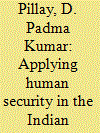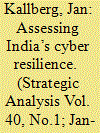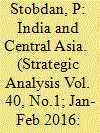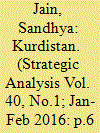| Srl | Item |
| 1 |
ID:
142913


|
|
|
|
|
| Summary/Abstract |
This article explores the concept of human security and examines the scope for its adoption as a normative and policy framework in India. Human security prioritises non-military methods as a means of achieving security without compromising the priorities accorded to traditional security threats. It requires the fulfilment of people’s basic needs and rights. The objective of the article is to show that the human security approach can be usefully applied as a policy measure in India to reinforce successes in the social and economic spheres so that the possibility of dissatisfaction turning into violent opposition and internal conflict is minimised.
|
|
|
|
|
|
|
|
|
|
|
|
|
|
|
|
| 2 |
ID:
142909


|
|
|
|
|
| Summary/Abstract |
In this commentary, I will use strategic cyberwar theory1 to explain why India has a higher level of cyber resilience than several of its potential adversaries. Even if India has challenges in its government-led cyber defence,2 there are cyber resilience benefits to be drawn from the way Indian society operates, functions and is constitutionally designed and accepted by its constituents, independently of any cyber defence efforts. First, the concept of strategic cyberwar. A strategic cyberwar is a major conflict relying on heavy utilisation of digital means, a form of conflict that we have not yet seen but that is likely to be a potential threat a few decades into the future. Even if technological breakthroughs, adaptations and software development are accelerating at an increasingly high rate, the delay is not a technical issue. Technical evolutions in the software and services sphere are single lines of development. The complexity of cyber war increases with the time factor when cyber conflicts are likely thought at computational speeds. This require an acceptance of cyber as a form of war by itself because it operates in a battle space untangled from other forms of war fighting. Therefore, cyber cannot be seen as only an enabler in traditional defence.
|
|
|
|
|
|
|
|
|
|
|
|
|
|
|
|
| 3 |
ID:
142912


|
|
|
|
|
| Summary/Abstract |
China has always been an important neighbour to Nepal which has otherwise historically been heavily influenced by India. The ‘rise of China’ has created a more outward-looking Middle Kingdom and so its influence in Nepal has significantly increased within the last decade. As a consequence, Nepal is experiencing growing interest from China. This article aims to give some historical background to Sino-Nepalese relations and to measure the most recent impact of the ‘rise of China’ on Nepal, particularly on its economic, military and political fronts. This is followed by a broader look at China’s policy towards Nepal, also taking into account China’s overall strategy towards South Asia. Apart from China’s relationship with India, the issues of stability in Tibet as well as Tibetan refugees within Nepal remain important factors for the Sino-Nepalese relationship even to this day.
|
|
|
|
|
|
|
|
|
|
|
|
|
|
|
|
| 4 |
ID:
142911


|
|
|
|
|
| Summary/Abstract |
India was always aware of the enormous energy reserves within its geographically proximate Central Asian region that could potentially fulfil its energy demands. The recent visit by Prime Minister Modi to the region has proved critical in paving the way for India to finally acquire a long awaited energy stake in the region. The new developments could not have been possible without the evolving undercurrents of the new geopolitical balance of power in the region. Russia seems to be playing a conspicuous role in nudging both India and Pakistan towards cooperation in the energy pipeline. However, there is no case to be euphoric on this front. India’s energy diplomacy in Central Asia will fail if it continues to discount the Russia factor in its policy.
|
|
|
|
|
|
|
|
|
|
|
|
|
|
|
|
| 5 |
ID:
142910


|
|
|
|
|
| Summary/Abstract |
The rise of Dawlat al-Islamiyah f’al-Iraq w Belaad al-Sham (Daesh), or Islamic State in Iraq and Syria (ISIS), in the vacuum created by the war in these countries has reignited the Kurdish question that Mustafa Kemal Ataturk skilfully bypassed after World War I, when several nation-states were carved out of the defeated Ottoman Empire. The Kurdish problem began in the early 19th century when the Ottomans centralised the administration, emphasised Turkish identity, erased the autonomous Kurdish emirates and ruthlessly suppressed their protests. This purge of ethnic identity was behind the Armenian massacres of the late 19th century, which became a full blown genocide in 1915–1916. The Greeks were handled via population exchanges, leaving the Kurds as a large and restless minority in the region.
|
|
|
|
|
|
|
|
|
|
|
|
|
|
|
|